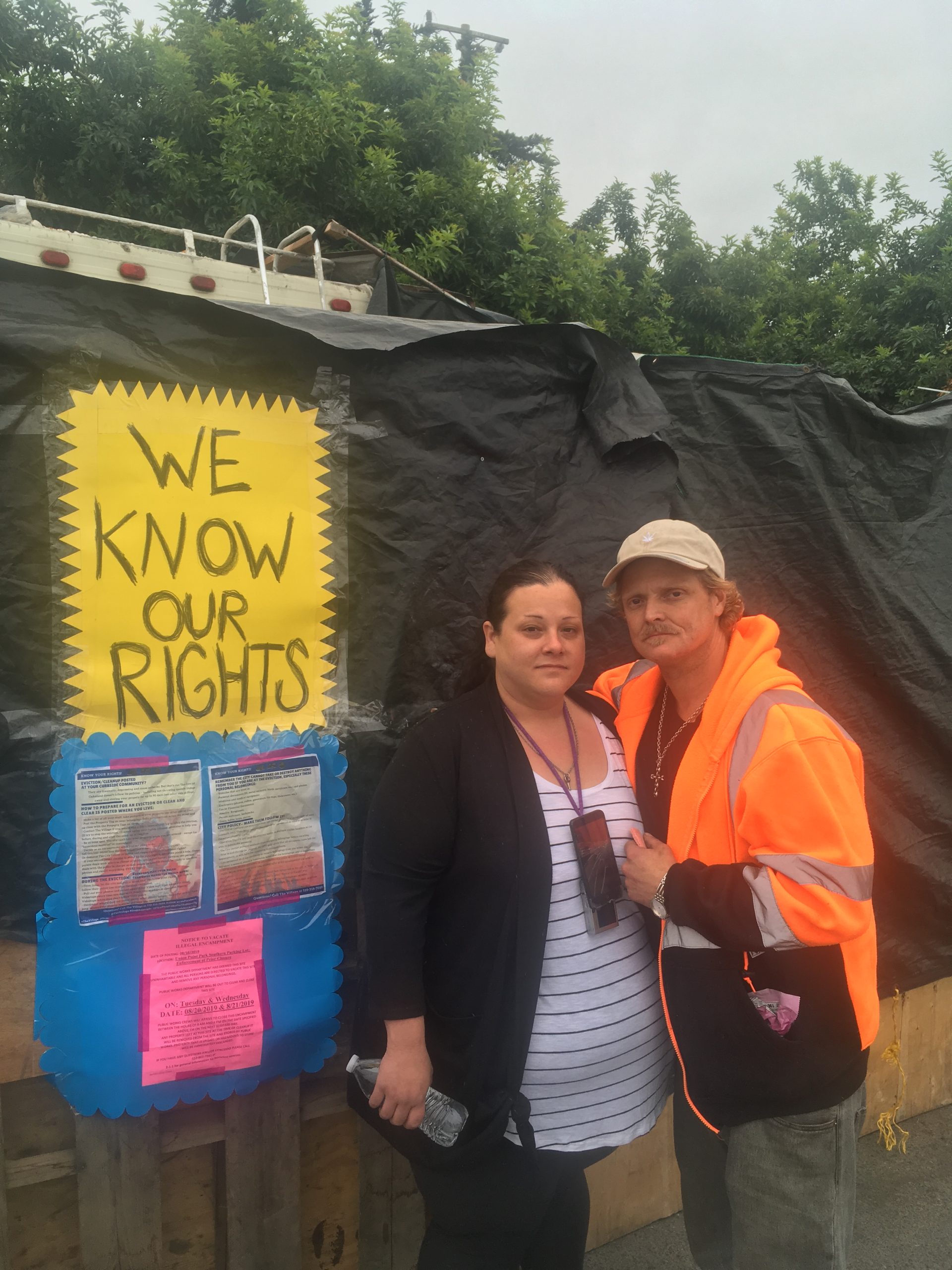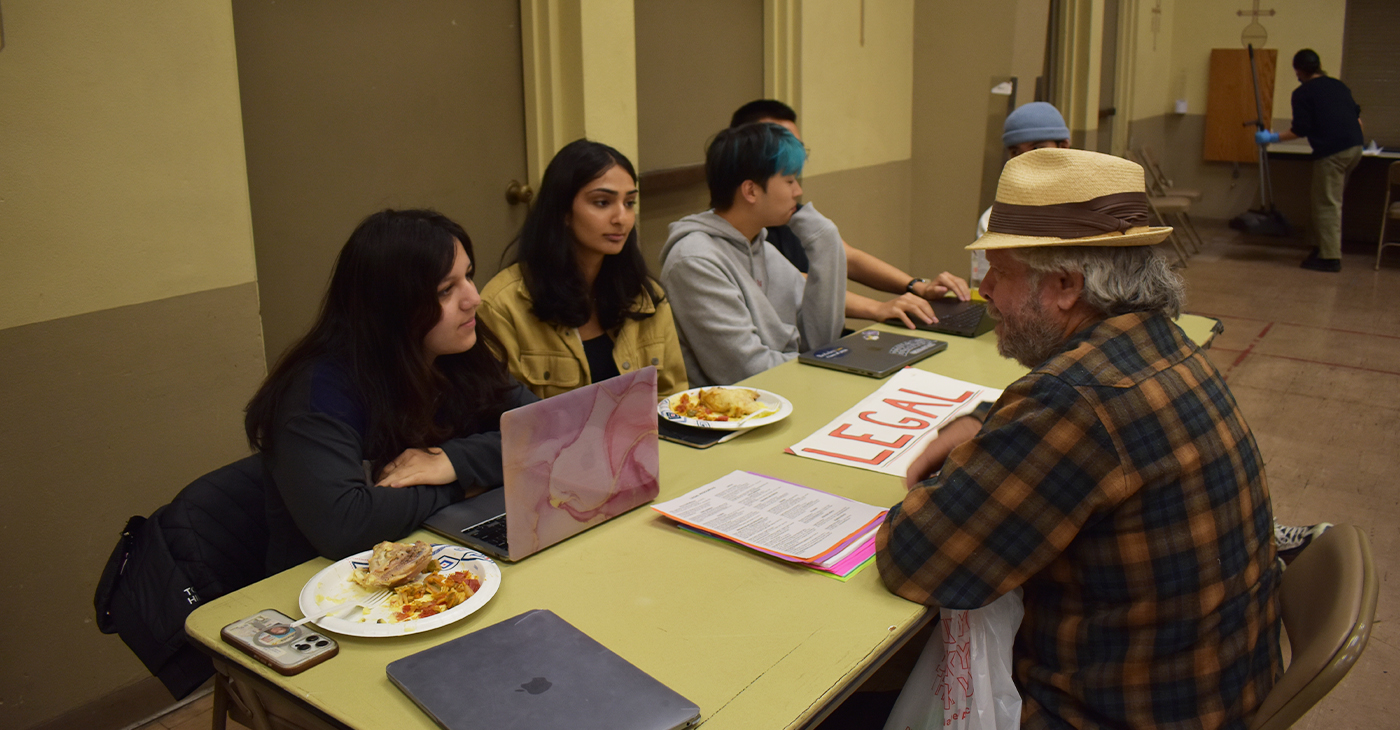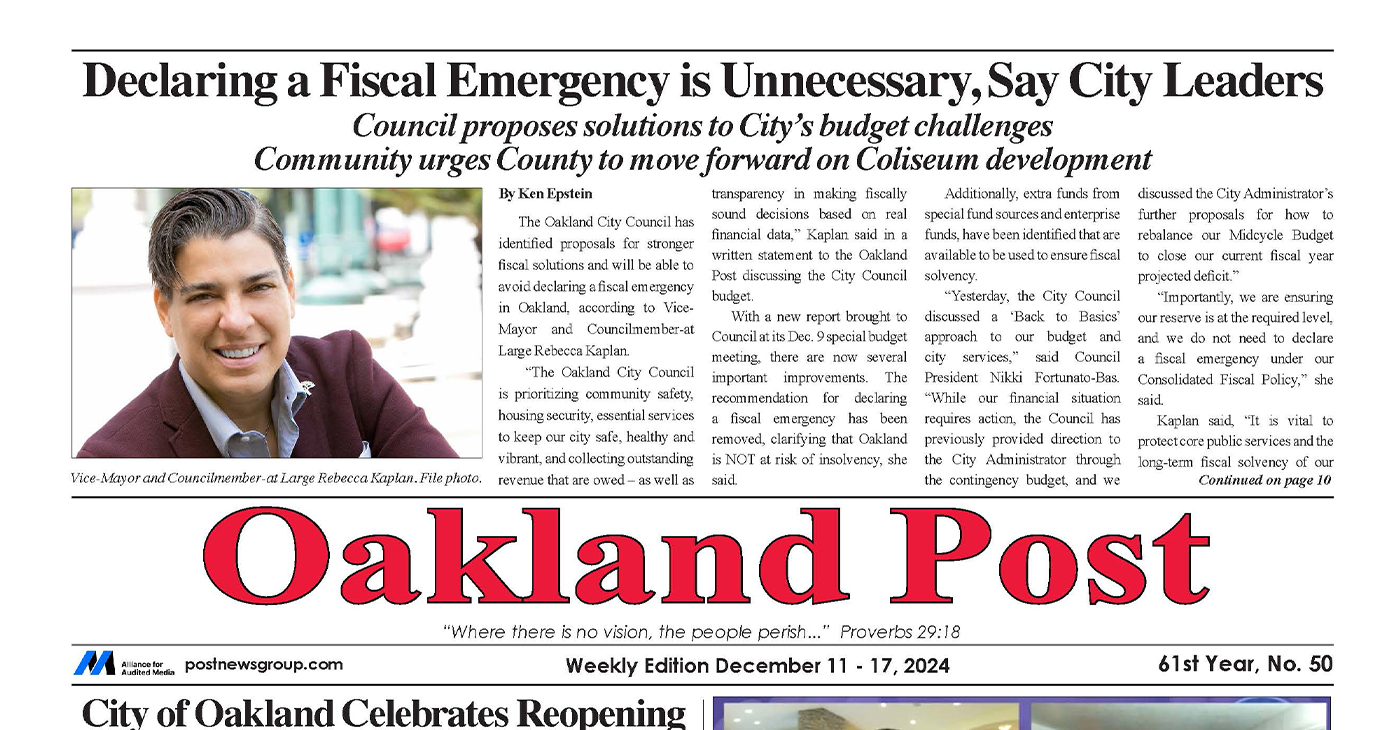Homeless
Oakland Evicts Residents of Union Point Homeless Camp

Oakland’s Department of Public Works (ODPW) and Oakland’s Police Department (OPD) and Auto Plus Towing evicted at least 20 adults and five children who were living in RVs, campers, and other vehicles in a parking lot in Union Point Park on Tuesday.
“I grew up within a mile radius of here my whole life and I’m a member of this community but they’re trying to shuffle me out of where I’m from,” said Nicole Kahele. “We’re staying in a public park because there’s no affordable housing.”
Kahele is one of four Union Point community members who, after experiencing past evictions, filed a lawsuit claiming the City of Oakland and Mayor Libby Schaaf are violating their fourth, eighth, and 14th amendment rights and that ODPW is not following its own stated policy when it evicts unhoused residents.
“The City is supposed to bag, identify and tag all the property that people want to keep but can’t take with them and store it for free for three months,” said Needa Bee, an unhoused, lifelong Oakland resident who lives outside of Union Point but is helping with the suit. “That has never happened in the three years that I have been following evictions.”
Kahele and the other defendants, all of whom lived at Union Point before the eviction, had filed a restraining order to U.S. District Judge Charles Breyer through their lawyer, Emily Rose Johns, that prevented ODPW from evicting them.
The order also protected other Union Point residents, as the city couldn’t evict some residents while allowing others to stay. But the city successfully challenged and overturned the order while Johns was on vacation and posted eviction notices on Friday, Aug 16, leaving most Union Park residents five days to pack all of their belongings to leave.
The rush to pack was especially difficult for those who have physical limitations and/ or disabilities. Elijah Marra, who was recovering from hernia surgery that he’d had two days before, complained of sharp abdominal pains as he packed his belongings. While he was able to keep his most important belongings, there was much he had to throw away.
Residents whose vehicles didn’t run, like lifelong Oakland resident Dre Nash, had to have them towed and impounded. The City offered some of these residents a single night in a homeless shelter but no one was offered permanent housing. Nash’s RV home and almost all of his belongings are currently in an impound lot and he’s unsure of when or how he can get them back.
Oakland’s assistant city administrator Joe DeVries, who helps to organize and implement the Schaaf’s administrations plans and policies for homelessness, claims that he and the city see eviction as a last resort, but that they’ve received complaints from housed residents, as well as the Bay Conservation and Development Commission and the California Coastal Commission.
“It’s tidewater land and it’s protected so it’s really not an appropriate place to have people camping,” said DeVries.
While DeVries claims the encampment was filled with trash and not well kept, those staying at Union Point claim it’s difficult to keep clean when the city doesn’t provide consistent trash service, and that housed residents would have the same issues if they didn’t have weekly trash pickup.
None of the Union Point residents the Oakland Post spoke with wanted to leave the site without being offered another permanent living option and many claimed they felt safe there as they supported each other.
While Union Point’s residents claim that some housed people come by and harass them, some nearby housed residents say they don’t want them forced out.
“They’ve fallen on hard times and everything’s so damn expensive here,” said Douglas Thorn, who’s lived near Union Point for three years. “I think they’re decent people, and I enjoy having them here.”
Activism
A Student-Run Group Provides Critical Support Services to Underserved Residents
Those visiting The Suitcase Clinic can get legal advice, sign up for food assistance, receive housing resources, get medical help, or enjoy a hot, fresh meal. They can also get haircuts and foot washes from the student volunteers. Nilo Golchini, executive director of the clinic, said one of the goals for most of the students working there is helping bridge the gap of trust that exists between many unhoused people and the healthcare and social welfare systems.

Part One
By Magaly Muñoz
Every Tuesday evening, the dining hall of First Presbyterian Church fills up with dozens of people eating, laughing and moving from table to table, receiving much-needed services from UC Berkeley students – just a few blocks away from the university’s campus.
Individuals seeking support services can be found in this multi-stationed room on the south end of the church talking to law students, student case managers, or receiving medical attention in a corner by healthcare professionals.
This weekly event is hosted by Cal students through a volunteer-run program called The Suitcase Clinic.
The clinic, founded in 1989, was intended to offer free resources to underserved communities in Berkeley and surrounding cities. The majority of the clinic’s clientele are unhoused or low-income people looking for extra support.
Those visiting the clinic can get legal advice, sign up for food assistance, receive housing resources, get medical help, or enjoy a hot, fresh meal. They can also get haircuts and foot washes from the student volunteers.
Nilo Golchini, executive director of the clinic, said one of the goals for most of the students working there is helping bridge the gap of trust that exists between many unhoused people and the healthcare and social welfare systems.
During their tenure in the program, many of the students say they become strong advocates for homelessness rights.

Visitors of the Suitcase Clinic can receive haircuts and foot washing by student volunteers every Tuesday evening. Photo by Magaly Muñoz.
“We’re also standing in solidarity with them. So, it’s not saying, ‘I’m going to help you, but I’m also going to stand with you,’” Golchini said.
Student volunteers get extensive training prior to working directly with clients. Those interested have to take a semester-long class to become versed in areas such as outreach, intersectionality, how to interact with unhoused people, how to sign people up for social services. and more.
Volunteers then get to pick from three different clinics: General, Women’s, or Youth and LGBTQ+.
The General Clinic is the most popular among visiting residents, while Women’s and Youth/LQBTQ+ have more specialized services for attendees.
The Women’s Clinic has many of the similar services to General, but also includes nail painting, childcare, and massages.
The Youth and LGBTQ+ Clinic offers a safe space for young people navigating living on the streets, with services that include housing referrals, wellness and recreation classes and employment resources.
Golchini explained that it’s important for them to keep these clinics separate because the different demographics experience poverty and homelessness differently than those who visit the General Clinic.

Suitcase Clinic student workers posing for a photo with a frequent clinic attendee. The Clinic is open to Berkeley unhoused and low-income residents who need medical or legal service, or a hot meal. Photo by Magaly Muñoz.
“We’re able to provide spaces where people can come in and feel safe and not feel like they’re constantly worried that something’s going to happen to them,” she said.
An outreach team also visits encampments every other Saturday in the Berkeley area to provide hygiene kits and encourage people to visit the in-person clinic, if possible.
However, Golchini said engagement has been low for some time now due to a recent decision by the U.S. Supreme Court that allows cities to ban and cite people for sleeping on the streets.
She said a lot of their clientele got displaced to other cities over time, making it difficult to stay in contact with the services the Clinic was providing for them.
But that hasn’t slowed down the students at the Clinic, if anything, it has pushed them to do more for the community they serve.
Activism
Oakland Post: Week of December 11 – 17, 2024
The printed Weekly Edition of the Oakland Post: Week of December 11 – 17, 2024

To enlarge your view of this issue, use the slider, magnifying glass icon or full page icon in the lower right corner of the browser window. ![]()
Activism
Black Talk Radio Network’s Recent Podcast Offers Perspective on Nov. 5 Election
“Time for an Awakening” is a Black Talk Radio Network program that runs on Sundays from 7-9 p.m. According to the program’s website, past guests have included Dr. Molefi Asanta, BaBa Ashra Kwesi, BaBa Runoko Rashidai, Dr. Leonard Jeffies, Michelle Alexander. Boyce Watkins, State of Black Farmers series and many others.

Special to The Post
University of Houston Professor of African American Studies Professor Dr. Gerald Horne and renowned speaker and advocate for Pan-African unity, Obi Egbuna Jr, were in conversation on the podcast “Time for an Awakening” hosted by Bro. Elliott and Bro. Richard on Dec. 1.
“Time for an Awakening” is a Black Talk Radio Network program that runs on Sundays from 7-9 p.m.
According to the program’s website, past guests have included Dr. Molefi Asanta, BaBa Ashra Kwesi, BaBa Runoko Rashidai, Dr. Leonard Jeffies, Michelle Alexander. Boyce Watkins, State of Black Farmers series and many others.
With the election in the rearview mirror, Horne, a historian, and author of “The Apocalypse of Settler Colonialism” and “Jazz and Justice: Racism and the Political Economy of the Music,” raised the idea of a Black International Front Conference.
He described proposed locations and the need for independent political organizing in Black communities across the country, with a focus on local elections and alternatives to the direction of Black political leadership.
Joining the conversation in the second hour with valuable information was the External Relations officer to the Zimbabwe-Cuba Friendship Association, and former correspondent to the Herald, Zimbabwe’s national newspaper, Obi Egbuna Jr. A poet and playwright, Egbuna is most known for his passion in creating ties within and among the people and nations of the African diaspora.
He has organized chapters of the Pan African Student Youth Movement in St. Louis, Missouri, Seattle Washington, Charlottesville Virginia and Chicago, Illinois, Egbuna has also written several Resolutions to the United Nations covering a wide range of issues, including HIV/AIDS in Zimbabwe and Police Brutality issues in the United States.
To listen to the podcast, please go to https://timeforanawakening.com/?powerpress_pinw=111154-podcast.
Sources for this story include Wikipedia and Time for an Awakening media.
-

 Activism4 weeks ago
Activism4 weeks agoOakland Post: Week of November 20 – 26, 2024
-

 California Black Media3 weeks ago
California Black Media3 weeks agoCalifornia to Offer $43.7 Million in Federal Grants to Combat Hate Crimes
-

 Activism4 weeks ago
Activism4 weeks agoAn Inside Look into How San Francisco Analyzes Homeless Encampments
-

 Black History3 weeks ago
Black History3 weeks agoEmeline King: A Trailblazer in the Automotive Industry
-

 California Black Media3 weeks ago
California Black Media3 weeks agoCalifornia Department of Aging Offers Free Resources for Family Caregivers in November
-

 California Black Media3 weeks ago
California Black Media3 weeks agoGov. Newsom Goes to Washington to Advocate for California Priorities
-

 Activism3 weeks ago
Activism3 weeks agoOCCUR Hosts “Faith Forward” Conference in Oakland
-

 #NNPA BlackPress4 weeks ago
#NNPA BlackPress4 weeks agoPRESS ROOM: Clyburn, Pressley, Scanlon, Colleagues Urge Biden to Use Clemency Power to Address Mass Incarceration Before Leaving Office















































